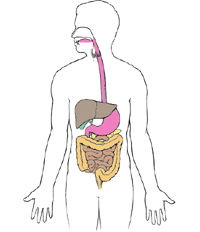|
Enzymes are complex protein molecules that induce and accelerate the speed of chemical changes in other compounds. They are found throughout the human body, and are essential for digesting food, regulating biochemical reactions, generating energy, and repairing tissues, organs, and cells. Enzymes can be categorized into two groups: digestive and metabolic. Digestive enzymes are secreted along the entire gastrointestinal tract, and break down food into particles that can be readily absorbed and assimilated by the body.
|
In a healthy digestive system, the enzymes present
in raw foods work synergistically with the body’s
endogenous enzymes to digest food components
completely and effectively. However, cooking and
heat processing destroy raw food enzymes, placing
the full burden of digestion of the pancreas and
other digestive organs. Certain health conditions
also can affect the |
 |
Courtesy of the
American Medical Association: “AMA Health Insight: Atlas of the Human Body” |
| body’s ability to produce its own
enzymes, resulting in fewer enzymes excreted from the pancreas, stomach, and brush-border membrane of the small intestine. Both of these situations can adversely affect the gastrointestinal system, leading to common problems such as abdominal pain, bloating, gas, indigestion, gastric reflux, constipation, and diarrhea. |
Over time, impaired digestion can have more far-reaching effects. Food that remains undigested or partially digested in the gut can putrefy and produce toxins that can leak into the bloodstream, in some cases causing fatigue, headaches, and behavioral symptoms. Irritation and inflammation can result, leading to an increase in intestinal permeability, or “leaky gut.” Undigested protein molecules also can cross the intestinal lining and trigger immunological reactions such as allergies, asthma, and skin rashes. Decreased digestive enzyme activity can result in malabsorption of nutrients, affecting overall health and potentially leading to intestinal dysbiosis and other unhealthy conditions.
Research has shown that one way to support the digestive process is to supplement the diet with digestive enzymes. Supplemental enzymes can assist in the breakdown of food, reduce the number of large and potentially inflammatory molecules leaking through the intestinal membrane, and enhance the absorption of
vitamins and minerals by reducing food to its essential elements.
|


